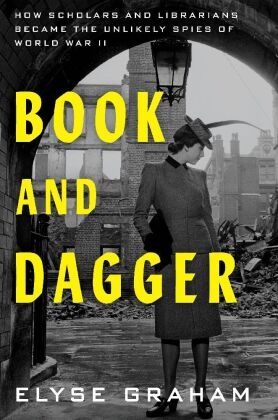
Book and Dagger - How Scholars and Librarians Became the Unlikely Spies of World War II
| Verlag | HarperCollins US |
| Auflage | 2024 |
| Seiten | 400 |
| Format | 15,2 x 2,2 x 22,9 cm |
| Trade PB | |
| Gewicht | 379 g |
| Artikeltyp | Englisches Buch |
| EAN | 9780063417304 |
| Bestell-Nr | 06341730EA |
The untold story of the academics who became OSS spies, invented modern spycraft, and helped turn the tide of the war
At the start of WWII, the U.S. found itself in desperate need of an intelligence agency. The Office of Strategic Services (OSS), a precursor to today's CIA, was quickly formed-and, in an effort to fill its ranks with experts, the OSS turned to academia for recruits. Suddenly, literature professors, librarians, and historians were training to perform undercover operations and investigative work-and these surprising spies would go on to profoundly shape both the course of the war and our cultural institutions with their efforts.
In Book and Dagger, Elyse Graham draws on personal histories, letters, and declassified OSS files to tell the story of a small but connected group of humanities scholars turned spies. Among them are Joseph Curtiss, a literature professor who hunted down German spies and turned them into double agents; Sherman Kent, a smart-m outhed history professor who rose to become the head of analysis for all of Europe and Africa; and Adele Kibre, an archivist who was sent to Stockholm to secretly acquire documents for the OSS. These unforgettable characters would ultimately help lay the foundations of modern intelligence and transform American higher education when they returned after the war.
Thrillingly paced and rigorously researched, Book and Dagger is an inspiring and gripping true story about a group of academics who helped beat the Nazis-a tale that reveals the indelible power of the humanities to change the world.
Rezension:
"An engaging study of wartime American intelligence. . . . Graham makes a good case for studying the humanities as both an instrument of learning and a weapon of war. Bibliophiles with a taste for cloak-and-dagger work will enjoy this lively book." - Kirkus Reviews
"Thrilling. . . With a keen ear for narrative prose, Graham builds suspense and intrigue, and the book is a pulpy delight. . . . Book and Dagger is a necessary reminder of the value of the humanities and of the freedom of information and ideas at a time when both of those things are under threat." - BookPage (starred review)
"Entertainingly conveyed, with great respect and deep appreciation for their ingenuity and drive, Graham's history is a powerful symphony for these unsung heroes whose professional skills and personal courage brought down the Nazi state. The modern intelligence community owes its existence to their rigor and resourcefulness. Readers fascinated by espionage will be eager to checkout Graham's fresh telling of the surprising story of the OSS." - Booklist (starred review)
"This deeply researched and engaging account shines a light on a vital but little-known aspect of intelligence gathering. Readers interested in World War II espionage and the role scholars have played in surveillance and reconnaissance campaigns will enjoy this volume." - Library Journal
"Written like a spy thriller, this well-researched tale shines a light on a little-known side of espionage history." - Arlington Magazine
"Book and Dagger brings to light a spellbinding, untold aspect of World War II history...Graham takes readers all over the world to show that as the Nazis burned books, book lovers were defending the freedom of ideas, with relish." - BookPage, 14 Most Anticipated Books of Fall
"Entertaining. . . Enriched by Graham's exuberant prose, this is a colorful salute to some of WWII's more bookish heroes." - Publishers Weekly
"Fascinating." - Peopl e
"In her lively Book and Dagger, the historian Elyse Graham rescues a cast of scholar-spies from obscurity." - New York Times Book Review
"Graham is right to stress that archivists, number-crunchers and humanities professors holed up in mostly drab offices made some of America's most innovative contributions to the secret war against Hitler. . . . Graham's account is well-researched and scrupulously footnoted, but she also writes with a pulpy panache that turns the book into a well-paced thriller."
- Washington Post
